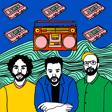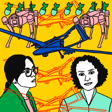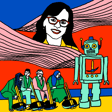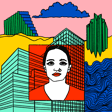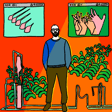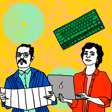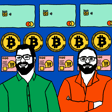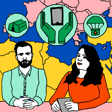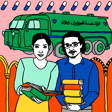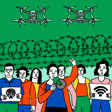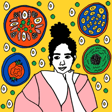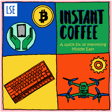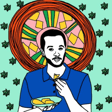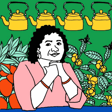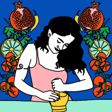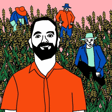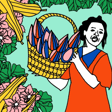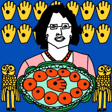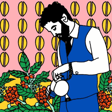Become a Creator today!Start creating today - Share your story with the world!
Start for free
00:00:00
00:00:01

1.6. Feminism in Kurdistan with Houzan Mahmoud
On this episode of Instant Coffee, Isabel Käser talks to Houzan Mahmoud about the state of feminism in Kurdistan and Culture Project, a platform for writers, feminists, artists and activists from Kurdistan and the Kurdish diaspora to freely express their ideas. Houzan, a Kurdish feminist and public lecturer is co-founder of Culture Project. Culture Project: cultureproject.org.uk/ Kurdish Women's Stories (edited by Houzan Mahmoud): www.waterstones.com/book/kurdish-wo…//9780745341132
Transcript
Evolution of Feminism's Perception
00:00:00
Speaker
Back in the days, people would kind of point fingers to you. That is the feminism. This is a feminist as a dangerous thing. But nowadays, because of a lot of really fight that we had to do, it is becoming more acceptable. And you have more and more people identifying as a feminist, which is, you know, which is really good to see that.
'Instant Coffee' Podcast Introduction
00:00:20
Speaker
This is Instant Coffee, a new podcast brought to you by the LSE Middle East Center and produced by me Nadine Almanaspi and me Ribal Sleiman Haydad.
00:00:32
Speaker
On this episode, Isabel Kaisa speaks to Huzan Mahmoud about the state of feminism in Kurdistan. Isabel is visiting fellow at the LSE Middle East Centre and a postdoctoral research associate at the Centre for Gender Studies at SOAS, University of London. Huzan is a Kurdish feminist, writer and public lecturer.
Founding of Culture Project
00:00:52
Speaker
She is the co-founder of Culture Project, a project formed to raise awareness about feminism and gender in Kurdistan and the diaspora. Over to you Isabel.
00:01:03
Speaker
Joseann, hello. Hi, it's such a pleasure to speak to you today. Welcome to this podcast. Hello, Isabel. Thank you so much for this opportunity. Joseann, you've been a feminist activist in both Kurdistan and the UK for a long time. In recent years, you've mainly been building Culture Project, a platform for feminism, art and culture. What were the thoughts that went into founding Culture Project?
00:01:29
Speaker
Well, thank you so much for this, Isabelle. And the idea of Culture Project came about four, five years ago.
Challenging Gender Norms in Kurdistan
00:01:40
Speaker
And initially we founded Culture Project in 2016 with two other friends and colleagues who were novelists, Ismail Hamallah and Miran Abraham.
00:01:52
Speaker
After a long time of feminist activism in Iraq and Kurdistan and working, for example, with Organization of Women's Freedom in Iraq and supporting various other initiatives, both in Iraqi Kurdistan and in Iraq itself, as well as in the diaspora, mainly focused and centered around feminism and feminist activism, as well as defending women's rights, opposing the war on Iraq, and lots of other really issues,
00:02:20
Speaker
But then at some point I realized that just focusing on violence against women on its own and just, for example, not tackling other issues or
00:02:36
Speaker
questioning the variety of stereotypical representations of Kurdish women, specifically speaking in cultural productions as well as in politics and philosophy and art and in a lot of things.
00:02:51
Speaker
I realized that we need to include men as well and then to question all of the cultural productions, to question the lots of things that is happening under the so-called like the protects of cultural values and norms and so on and so forth.
Addressing Misrepresentation and Gender Violence
00:03:09
Speaker
So Kotter Project really was created from a feminist perspective, questioning values, gendered norms and relations that are outdated, that has to be opposed in literature, in poetry, in art itself, as well as we are very keen for women empowerment through art and literature and photography and lots of other things. And so Kotter Project is a very
00:03:35
Speaker
diverse. It doesn't have one particular focus, but it looks into many ways in terms of empowering women, but also to work with men and to have this joint initiative to change mentalities on the ground, basically.
00:03:57
Speaker
What were some of the main issues that you felt needed addressing at that time in Kurdistan? You mentioned the false representation of Kurdish women, but also the focus on gender-based violence. You mentioned the cultural production. What were some of the predominant issues that you wanted to address at that time?
00:04:20
Speaker
Yes, we have produced six volumes of Culture magazine. It is a printed magazine in Kurdistan, but also we have the digital format of it. We have various writers ranging from young, aspiring writers, as well as very well-established writers, both male and female. And in the Culture magazine
Empowering Young Female Writers
00:04:44
Speaker
that we produced for Kurdistan, the print one,
00:04:48
Speaker
We had an entire section written about the question of women in Kurdish society, the misrepresentation of women in literature, in poetry, in film, in advertisements, in media particularly. So we had various writers questioning and writing about these stereotypical images. We also organized
00:05:14
Speaker
various lectures at the University of Soleimania in collaboration with the College of Fine Arts about gender and cultural production or about film and feminism and showing a particular short film about the issue of abortion, which was a taboo, which is still a very taboo question in Kurdish society. So we have tried to really kind of bring to the fore many taboo issues but to speak about them in the medium of film, photography, short film,
00:05:44
Speaker
art, literature and so on and so forth. And we have many young female short story writers that we hope to be able to publish their writings in English in the near future as well. At this point that we are speaking, we are conducting a series of reviews, art review of female Kurdish artists
Challenges of Feminist Activism in Kurdistan
00:06:05
Speaker
that their art is really
00:06:06
Speaker
interestingly amazing but it hasn't really come out to light to the English speaking readers around the world so we are trying to do that as well and also we conducted various interviews with other Kurdish well-established artists throughout the world so we are trying every now and then to kind of get an initiative and to
00:06:32
Speaker
bring various aspects of Kurdish culture, literature and intellectualism as well. Before we speak more about art-making in the region, I was just wondering if you could give a brief overview of the state of feminist issues in Kurdistan. What are some of the main issues that activists on the ground
00:06:54
Speaker
are tackling or are struggling with? Like any other society, obviously, there are different ways of thinking and approaches to the question of women in Kurdish society as well. I mean, there are organizations who are NGOs foreign funded or local or funded by the KRG, Kurdish Regional Government.
00:07:14
Speaker
They have a very particular focus on either providing a service to battered women or to refugee women from Syria and the rest of Iraq and so on and so forth. Their focus is obviously
00:07:32
Speaker
aligned with what really the funders programs are. For example, their major focus lately have been on more women in ministerial positions, more women in parliament or gender balance and so on. These could be also important issues, but to me, they are not so relevant to the majority of Kurdish women, to be honest with you, whereas there are many other problems and issues that really need theorization, that really need tackling as well as raising awareness
00:07:59
Speaker
in the wider society, not only getting more elitist women into the positions of parliament and ministerial and so on and so forth, which, you know, throughout experiences in the past many years, we didn't really have many influential female politicians or in the parliament, they only do is to support their own party's agenda, which is mainly patriarchal and
Independence from Political Agendas
00:08:24
Speaker
only reinforces patriarchal gender norms and relations. So I'm not really keen on that. What we try to do in Cultural Project is that to work on the margins, there are many brave Kurdish women activists, feminists, writers, artists who are doing amazing work in their local, you know,
00:08:46
Speaker
regions, but they don't come out to the light as much as other people. So this is why Qatar Project is a platform for those independent voices who are autonomous as well from the government, political parties, as well as from foreign intervention.
00:09:03
Speaker
So this is the kind of voice that we really truly want to represent. I mean, many years ago back then when me and some other colleagues or female feminist activists tried to talk about the issue of feminism or the word feminist itself or feminism,
00:09:20
Speaker
was such a difficult issue to talk about. To this moment, they kept on accusing us of imposing this sort of Western feminism on Kurdish women, and it's not compatible with our society, and lots of other reasons that they bring for so many other issues. But we really did not give up. We kept on raising awareness about feminism and the importance of feminist consciousness through writing, through seminars, conferences,
00:09:48
Speaker
in Kurdistan throughout Kurdistan and Culture magazine as well had a very good impact on that as well where we had many powerful feminist writers who contributed greatly to the knowledge production about Kurdish women's question
00:10:05
Speaker
from a feminist perspective. So, yeah, I mean, back in the days, people would kind of point fingers to you, that is the feminism, this is a feminist as a dangerous thing. But nowadays, because of a lot of really fights that we had to do, it is becoming more acceptable and you have more and more people identifying as a feminist, which is, you know, which is really good to see that.
00:10:29
Speaker
And so who would you say pushes back most against this at this point? Pushing back against your initiatives, your local initiatives? Yeah, because you know Qatar Project is really autonomous. It has no links or relations whatsoever to any government, political parties or male politicians or the kind of funders that
00:10:57
Speaker
exist, American, UK or EU governments who fund different organizations and projects in Kurdistan. We operate from London, so that's why we kept our own independence really from all the political linkages that are there. So people, I mean, organizations who are supported by the government, KRG, as well as by foreign funders,
Art as a Medium for Feminism
00:11:23
Speaker
they don't like such autonomous initiatives and they don't like the particular, you know, openness of activists like us speaking about taboo issues or criticizing why and how for so many years these organizations really failed even to create basic consciousness about feminism, let alone gender-based violence and so on and so forth.
00:11:52
Speaker
So I would say I don't want to generalize. There are really good autonomous independence groups here and there in Kurdistan, but they are also sidelined and pushed to the corner because they don't want to be aligned with anyone or with any political parties in that.
00:12:09
Speaker
for that matter. So that's why we have links with those types of autonomous individuals and groups on the ground. So this is why we managed to also work in Kurdistan as well as in Europe. I'm always really interested in the question of what can art do?
00:12:28
Speaker
We know that art can give a voice to those of sometimes marginalized, we know that it can bring to the fore certain issues. But in your work, how do you experience it on a daily basis? What have you seen, what art can do and what are some of the main issues that the young
00:12:47
Speaker
men and women want to speak about via their art? I think this is a very important issue as well. For example, the short film that we showed at the College of Fine Arts at the University of Soleimani about the abortion, it was really, really interesting how a short film in 10 minutes can touch upon such a taboo or such an important issue in society.
00:13:14
Speaker
and it was from an empowering point of view that was conducted. That's where a sculpture project we found it important to show it as well as to analyze it and speak about it. And the film director was there as well. She talked about it, which was really interesting. So these are the kind of powerful images that particularly females as well as young men can, from this new generation who are more open-minded and who are more exposed
Creative Struggles in Iraq and Kurdistan
00:13:43
Speaker
to the debates in the outside world and what's happening in terms of feminism and feminist critique of art and literature. I mean back in the days I wrote many essays and articles in Kurdish from about feminist critique of literature or art or poetry or
00:14:00
Speaker
even Kurdish folklore songs and so on. I know I have kind of, and so many of my female friends as well did the same for the past few years and we all kind of received rejection like how can you question Kurdish culture or literature or
00:14:19
Speaker
This is the product of the writer or the artist's imagination. It's not backward, it's not misogynist, but we did talk about these things openly and from a very critical point of view, but now it has become more kind of accepted. I mean, we had a young male
00:14:38
Speaker
an art student who did performances about virginity and why it is such a myth and irrelevant. And we had a lot of other young female and male students as well as activists who did a lot of actions.
00:15:00
Speaker
really against gendered norms that are not relevant anymore. So there are a lot of debates. I think every organization or every project or group, they need to kind of bring about controversial issues and talk about them from a theoretical perspective, particularly feminist perspective, that day by day it will become more accepted and more
00:15:28
Speaker
kind of talked about by other people as well. So nowadays I would say we are just relaxed and watching because there's a lot of other people talking about these issues, which is really nice. And if you look at the region more broadly, so if we say we look at Iraq as a whole or we look at other parts of Kurdistan, what are some of the main challenges of cultural and artistic production that you observe?
00:15:57
Speaker
Yeah, I mean, last year I went back to Kurdistan for over a month on a project I did for Gothe Institute that they funded various artists throughout Iraq. And it was a good opportunity for me to find out through interviewing them about their projects, what they've done, that I could see that there's a very nice, you know, awareness against violence, against women, against tribalists,
00:16:24
Speaker
norms against war, against Shia-Sunni divide. So what they tried to show is to reject all of that through their art, poetry, theater, short film, you know, paintings. I really find it really important throughout Kurdistan and Iraq that all these artists and writers and
00:16:50
Speaker
people try to use their creative skills to show in the hope to change the society's perception as well about women, about war, about conflict, about lots of other things. And as you know, this region has always been a region of war and conflict and dictatorship and religious fundamentalism and so
Transnational Feminist Dialogues
00:17:12
Speaker
on. And particularly Kurdistan is a zone of genocides
00:17:16
Speaker
you know, after, you know, various genocides and suppression and so on. So people are still wounded, you know, in terms of they still have, they still suffer from the bad memories from, you know, the aftermath of dictatorship, of wars, of fundamentalism,
00:17:36
Speaker
And I think artists could play an important role in terms of documentation, in terms of raising awareness, in terms of leaving an impact on different populations, in terms of changing their perception about particular gender relations of the time, really. And I think there are many interesting and important artists in all forms.
00:18:03
Speaker
in Kurdistan as well as in Iraq, that really their work should be brought to light more than now. And now there are interesting feminist conversations taking place, obviously transnationally, but also regionally across the different four parts of Kurdistan. If we look at the Rojava revolution, if we look at Eastern Turkey, we see what's happening in Iran as well. How
00:18:32
Speaker
do you tap into that conversation? How do you make sure that Culture Project but also you as an activist are involved in a transnational or in a trans-regional conversation? We do that through writing as well as seminars that we host both in London as well as in Kurdistan or other European countries and also by participation in different other conferences. And for the last 20
00:18:58
Speaker
to 23 years of my constant activism, I become aware of different patterns of activism and even feminism that really is kind of, some of it are, I would say,
00:19:17
Speaker
at this moment of time, unfortunately, they have a neoliberalist approach whereby everything is a project and fund and program of the funder, whereas you have other autonomous or grassroots activism and forms of organizations that are more autonomous and they reject capitalism, like you see that more in Rojava and
00:19:43
Speaker
you know, the Kurdish part of Turkey, you see that they reject this type of neoliberalization of the women's movement as well as
00:19:54
Speaker
they reject any form of capitalism and they have their own vision for women's rights equality and basically how to tackle gender relations in Kurdish society which I find them really interesting and important whereas in my part in Iraqi Kurdistan it's much more problematic and really much more kind of divided as well as
00:20:21
Speaker
there is various agendas there because of the oil. This is a society or a region that unfortunately in its ground there is tons of oil and that caused a lot of problems both for the population and for the women's question as well. You have multinational corporations, you have multinational organizations that they have because they have so much money and power
00:20:47
Speaker
they can dictate on what is to be done and what is to be said. So this form of neoliberal so-called feminism is you can see it clearly now in Iraqi Kurdistan, which we try to speak out against that really.
00:21:00
Speaker
But it's not easy because they have institutional power, they have powerful states behind them internationally as well as locally.
Collecting Kurdish Women's Narratives
00:21:09
Speaker
And so that makes it more difficult for independent activists like us to really kind of bring these differences into light.
00:21:22
Speaker
Hozan, one of the initiatives that Culture Project is doing is to encourage women's writing, women writing about their own lives. And you are just about to publish a collection of women's essays that sort of spans the four parts of Kurdistan, but also the Kurdish diaspora. What made you
00:21:42
Speaker
write that. What made you collect these stories? I thought Kurdish women's voices were absent for so long really because of decades of oppression, colonization, and as well as deprivation from studying, from entering academia, from
00:22:02
Speaker
traveling abroad from gaining knowledge, I mean Kurdish women were really deprived from that and there are of course various research and writings done about Kurdish women which are important and should be celebrated but at the same time I could really see that and feel that Kurdish women's voices, their direct voices is absent
00:22:25
Speaker
from research and also from telling their particular stories. That's why as an initiative we started in 2018 to collect stories and we told women just to feel completely free to write about any particular aspect of their lives. Some wrote about imprisonment, some wrote about losing their loved ones, some wrote about their days where they were Peshmerga fighters, others about exile, about love, about gender-based violence, about
00:22:54
Speaker
Lots of other issues, art, literature, poetry.
Amplifying Diverse Voices
00:22:58
Speaker
I mean, it's a collection of various Kurdish women with various experiences in life, but also it's of five generations, which is really, really interesting. So when you read that book, you come across five generations
00:23:15
Speaker
you know, telling their different stories, but also all, you know, you can always see there is, you know, the stories of war and conflict and devastation, but also of hope and powerfulness and resilience of Kurdish women, which is really nice. And I thought,
00:23:32
Speaker
it is important to have these voices and these are especially women who are not amplified that like other women. For example, when you look at Kurdish women's history, what the establishment is doing is to kind of make women visible that are linked or related to the establishment. But what Culture Project is trying to do is to get
00:23:57
Speaker
other women's voices that are equally or even more important than those amplified women by the regimes.
Conclusion and Future Insights
00:24:06
Speaker
So I thought it is important to have different voices from different political or social backgrounds and to give the reader a moment, a chance to really see that Kurdish women's lives and stories are as different or as unique as any other women in the world.
00:24:28
Speaker
Joseon, thank you so much for speaking to me and sharing with us your amazing experience and also talking about not only the challenges but also so many moments of hope. Thank you so much Isabelle for this opportunity, I really appreciate it.
00:24:47
Speaker
Thank you Isabel and Hozanne for taking the time to speak to us today and thank you for listening to Instant Coffee, your quick fix of everything Middle East. Join us every Friday for a new episode of Instant Coffee where we interview artists, activists, writers, journalists, and more from the region. To learn more about Hozanne's work and the Culture Project, follow the links in the podcast description. Don't forget to find us on Twitter, Facebook, and Instagram. Until next time,
